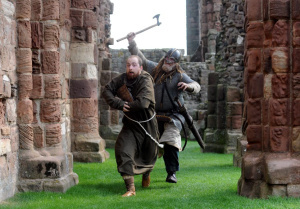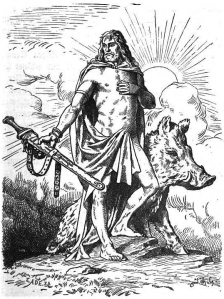5 Questions Viking History Experts Hear Every Day (and answer).
Vikings are cool. We can all admit it. They sailed on ships with dragon heads and terrorized villages and monasteries for two centuries, and are revered as fearsome warriors characterized as “Noble Savages.” Because of their popularity, folks always seem curious and full of questions when they meet someone who knows a great deal about them. The following are five questions Vikings History experts hear without fail at every dinner party they ever attend.
1. Why did the Vikings wear horns?
They didn’t. The horns on the helmet are an invention of a 19th century costume designer named Carl Doepler who wanted his “Vikings” to appear more barbaric during the 1876 Berlin staging of Richard Wagner’s opera The Ring of the Nibelung (the most famous song being Flight of the Valkyries). Unfortunately, the horns stuck, and here we are today answering this question.
2. Did the Vikings call themselves Vikings?
No. The word “Viking” is a derivation of the old Norse word “Vikingr” which literally means “Sea-Rover.” It was used during the 19th century by historians to describe the Scandinavian raiders of the early medieval period, but of course once it got out into the general public the word came to signify all Scandinavian peoples of that era. In reality, the Vikings would have called themselves after their home region. For example, the Annales D’Angoulême mention a group who attacked Nantes in 843 C.E. as referring to themselves as Vestfaldingi, or Men of Vestfold (a region in Norway).
3. What made them so cruel?
They lived in an age of violence. The Christians they attacked were no more peaceful than they. In fact, it was not uncommon for high ranking church officials to hire mercenary armies to attack noblemen who owed them money (which was often the case). Charlemagne, the most powerful ruler of the Christian world at the outset of the Viking Age, was notorious for massacring non-Chritians mercilessly. There is even a case where he captured some 3000 pagan Saxons and forcibly baptized them in the Elbe river where he ordered his men to drown them. The Vikings were not the only raiders of this time either. In the East, the Slavs frequently raided the land of Louis the German, and in the West the Bretons frequently raided across the Breton March in Brittany. So in reality, they were no more cruel than those they attacked.
4. Weren’t the Vikings really dirty?
Contrary to popular belief, the Vikings were cleaner than their Christian counterparts. The Middle Ages got its stinky reputation from the fact that Christianity viewed bathing as a sign of vanity, and therefore sin. There is a great quote from a French monk who said, “the more pious we are, the more we stink.” Before the Christianization of Scandinavia, it was culturally dictated that one should bathe at least once per week. Archeological finds have revealed a wealth of grooming items as well, which have indicated that the Vikings took personal hygiene and grooming very seriously. So in reality, the Vikings were clean, whereas the people they attacked stunk. Perhaps this explains why they slaughtered priests so easily–they thought they were infected with a pestilence.
5. Who is you favorite Viking god?
My favorite NORSE DEITY is Freyir, god of the hunt, war, and sex. He liked to eat meat, whoop ass, and romp. That’s my kind of guy. And he was very popular during the Viking Age for the same reason. He is often depicted as a statue with an erect phallus, which is both symbolic of how he was viewed by the Vikings, and good for a laugh among historians.
Personally, I am overjoyed that there is a renewed interest in the Vikings and I do not mind answering any questions about them in the least. I hope other Viking History experts feel the same. We have learned more about the Vikings in the last 20 years of research than in the previous two centuries of studies combined, and the discoveries are only increasing. It is an exciting field of history to be in, and I wouldn’t trade it for anything.
Sponsored Ad










